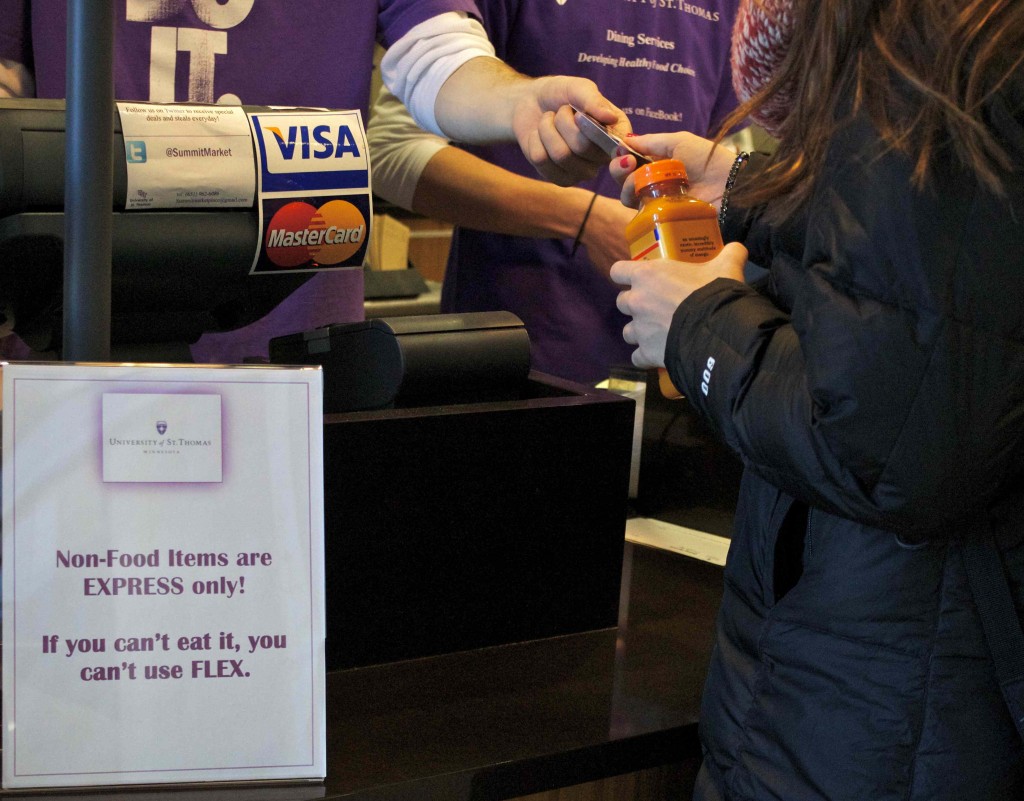
With a new sign that reads, “If you can’t eat it, you can’t use flex,” Anderson Student Center’s Summit Marketplace is taking a stricter approach in enforcing its policy spring semester.
Director of Dining Services Todd Empanger said this rule is not unfamiliar to the Summit Marketplace, however, hiring new management, reviewing training guidelines and updating register software are what encouraged a stricter route in enforcing the policy.
“What was being done in the past was wrong and the (previous) manager didn’t enforce the rules,” Empanger said. “We have a new person there, and we went through the policy. Now it’s being enforced.”
Empanger said the rule of using flex for food only was loosely followed by employees at the student convenience stores, which is what may have led to confusion among student buyers.
“Either they (cashiers) missed it, or they just neglected to follow it,” Empanger said.
Sarah Strain, a Summit Marketplace cashier, said the transition from the C-Store to Summit Marketplace may have contributed to the leniency of flex use.
“The policy wasn’t enforced as much since Summit Marketplace sells more than food items, whereas the old C-Store was really just food, so we didn’t have this problem,” Strain said.
Junior Paige Johnson said she is dissatisfied with Summit Marketplace’s policy.
“I hate it because being a resident adviser on campus, I have additional flex money that should allow me to purchase other needs,” Johnson said. “I want to be able to purchase paper towels if I want to, without it being in cash.”
Prior to the management posting the sign in Summit Marketplace, students were able to get away with buying toiletries, medication and other non-food items using flex dollars.
“You can’t have anything else besides food as part of flex purchases,” Empanger said. “It’s in a written document that if you are on a board plan, it is a food-only thing.”
Banning the use of flex dollars for non-food items is especially inconvenient for freshmen living on campus because they are required to purchase a meal plan.
“It’s awful,” freshman Taylor Case said. “My calculator dies, and I don’t want to have to pay out of my pocket knowing I have flex dollars to spend.”
Sophomore Sydney Westfield said she is more understanding of the rule.
“It may be rough for freshmen, but at the same time, it makes sense,” Westfield said.
Although some students are unwelcoming of the strictly enforced policy, Strain has experienced no difficulty with customers.
“They are really understanding about it, they will ask sometimes before they check out if they can or can’t (use flex dollars),” Strain said. “Most (students) are willing to either not buy their items that are not food or pay with another method.”
To prevent students from not purchasing the items altogether, Johnson offers a different option.
“Maybe they can have some kind of limit on the amount of non-food items students can buy with their flex dollars,” Johnson said.
While students can’t expect this change to be implemented by the store anytime soon, Empanger said he wants them to know the store isn’t “trying to rip them off.”
“We are just setting ourselves up like any convenience store operation,” Empanger said. “We are here to provide the service, and not take away any service we had prior.”
Eden Checkol can be reached at chec7168@stthomas.edu.


“It’s awful,” freshman Taylor Case said. “My calculator dies, and I don’t want to have to pay out of my pocket knowing I have flex dollars to spend.”
Seriously? This is a big deal?